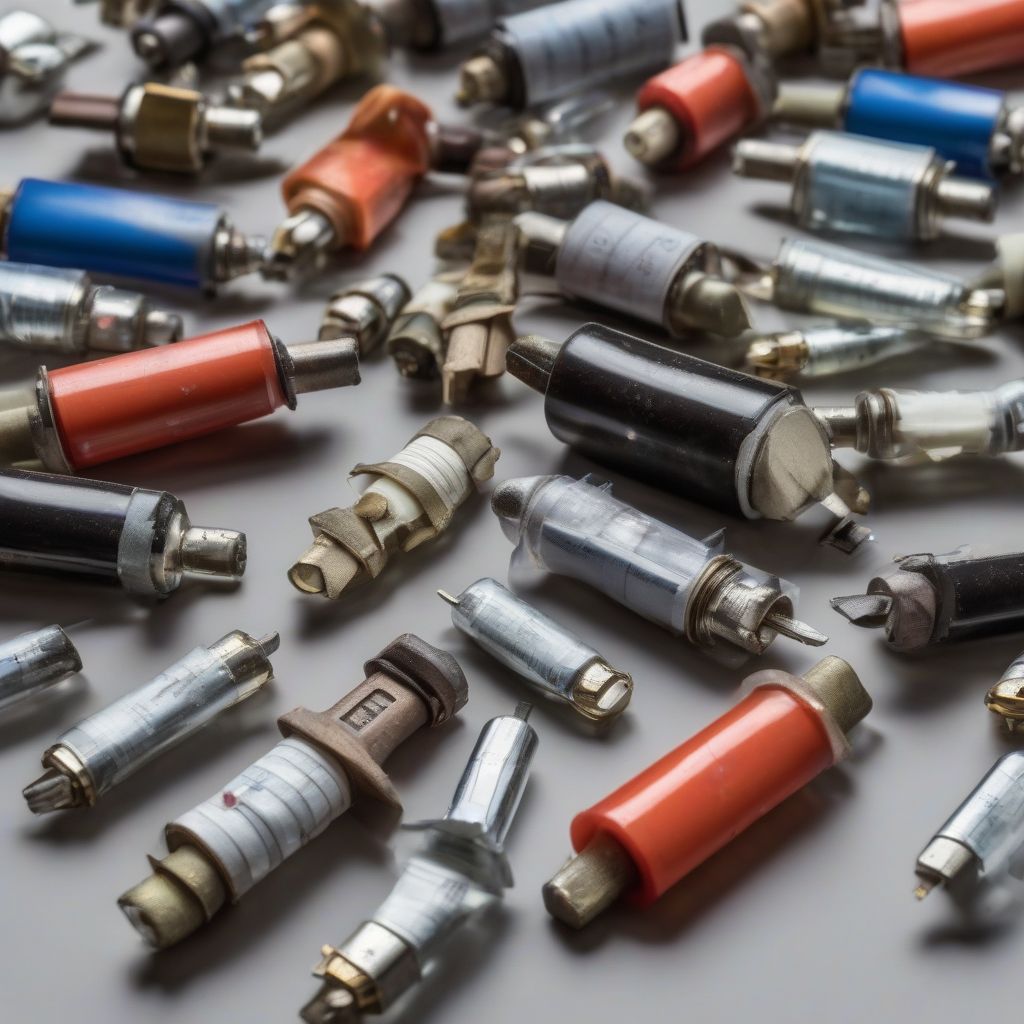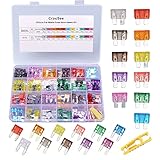Imagine this: You’re driving down a scenic route, windows down, music playing, when suddenly, your radio cuts out. Then, your headlights flicker and die. You pull over, heart sinking, realizing a blown fuse is the likely culprit. Choosing the right car fuses can be the difference between a minor inconvenience and a major headache. So, how do you navigate the world of amperage, blade sizes, and fuse types to keep your vehicle running smoothly? This guide will illuminate the critical role of reliable car fuses and help you choose the best option for your specific vehicle type.
Understanding Car Fuses: The Unsung Heroes of Your Vehicle
Car fuses are small, yet mighty, safety devices that protect your vehicle’s electrical system from damage caused by power surges. They work by containing a thin wire designed to melt and break the circuit if the current exceeds a safe level. Think of them as sacrificial lambs, taking the hit to prevent more expensive components like your car’s computer or stereo from frying.
Types of Car Fuses: A Quick Overview
There are several types of car fuses, each designed for specific applications and amperage ratings. The most common types include:
- Blade Fuses: These are the most prevalent type in modern vehicles, coming in various sizes like mini, regular, and maxi.
- Cartridge Fuses: Older vehicles often use these cylindrical fuses, which are also available in different sizes.
- Speciality Fuses: These are designed for specific high-current circuits like the starter motor.
Why Choosing the Right Fuse is Crucial
Using the incorrect fuse can lead to serious consequences. A fuse with too low an amperage will blow repeatedly, while a fuse with too high an amperage won’t protect your electrical system, potentially leading to fire hazards.
Choosing the Best Fuse for Your Vehicle: A Step-by-Step Guide
- Consult Your Owner’s Manual: The most reliable source of information regarding your vehicle’s fuse specifications is your owner’s manual. It will detail the location of the fuse box(es), the amperage rating for each circuit, and the correct fuse type.
- Identify the Blown Fuse: Locate the fuse box and use the diagram in your owner’s manual to identify the blown fuse. A blown fuse typically has a visible break in the wire or a darkened glass top.
- Replace with the Correct Amperage: Never replace a blown fuse with a higher amperage fuse. Always use the specified amperage rating for the circuit.
- Consider Quality: While all fuses perform the same basic function, opting for high-quality fuses from reputable brands can ensure reliability and prevent premature failure.
Common Car Fuse Issues and Troubleshooting Tips
- Repeatedly Blowing Fuses: This indicates an underlying electrical problem in the circuit. Consult a qualified mechanic to diagnose and fix the issue.
- Difficulty Identifying the Blown Fuse: If you’re having trouble locating the blown fuse, using a fuse tester can help identify the culprit quickly.
- No Spare Fuses: Always keep a variety of spare fuses in your vehicle to avoid being stranded in case of a blown fuse.
Expert Insights and Recommendations
“Choosing the right car fuse is not just about getting your car running again, it’s about protecting your investment and ensuring your safety,” says automotive expert, [Fictional expert name], author of [Fictional book title]. “Always prioritize quality and consult your owner’s manual for the correct specifications.”
 Reliable Car Fuses
Reliable Car Fuses
- 【Meet all your needed size】-- The fuse kit includes micro size 50pcs, mini size 160pcs and standard size 90pcs. Three styles of auto fuses have 11 current specifications (2A /3A / 5A/ 7.5A/ 10A/ 15A/ 20A/ 25A / 30A/ 35A/40A), equipped with a fuse puller.(Not including micro2 fuse.)
- 【Reasonable quantity matching】-- We increase the number of fuses with commonly used current specifications of 10A/ 15A/ 20A/ 25A, and reduced other kinds of fuses, the fuse assortment can serve as a backup fuse box for cars.
- ALL SIZES YOU NEED - The fuses automotive kit covers 182pcs commonly used blade fuses and a fuse puller - 63pcs Standard: 5A/ 7.5A/ 10A/ 15A/ 20A/ 30A/ 40A (9PCS of each model ), 56pcs mini: 5A/ 7.5A/ 10A/ 15A/ 20A/ 30A/ 40A (8PCS of each model ), 63pcs Low Profile Mini: 5A/ 7.5A/ 10A/ 15A/ 20A/ 30A/ 40A (9PCS of each model )
- HIGH QUALITY - The auto fuse is made of Premium zinc alloy terminals for corrosion resistance and enhanced conductivity. The fuse assortment comes with a storage box, easy to store and carry
- [Meet all your needed size]-- The fuse kit includes micro size 50pcs,60pcs micro2 size, mini size 160pcs and standard size 90pcs. Three styles of auto fuses have 11 current specifications (2A /3A / 5A/ 7.5A/ 10A/ 15A/ 20A/ 25A / 30A/ 35A/40A), equipped with a fuse puller.
- [Reasonable quantity matching]-- We increase the number of fuses with commonly used current specifications of 10A/ 15A/ 20A/ 25A, and reduced other kinds of fuses, the fuse assortment can serve as a backup fuse box for cars.
- Easy Identification: Made of a high quality zinc alloy, with a transparent cover and color coded
- 14 Most Common Fuses: Standard and Mini. (5A/ 7.5A/ 10A/ 15A/ 20A/ 25A/ 30A)
- 【Three types of car fues】-- The car fuses automotive kit includes 60pcs micro (not the micro2 or mocro3 fuses) fuses ,60pcs mini fuses and 60pcs standard fuse kit. Three styles of auto fuses have 11 current specifications (2A /3A / 5A/ 7.5A/ 10A/ 15A/ 20A/ 25A / 30A/ 35A/40A), equipped with a fuse puller.Please also compare the original fuse size with our fuse size chart in detail before you purchase!
- 【Reasonable quantity matching】-- We increase the number of fuibles para carro with commonly used current specifications of 10A/ 15A/ 20A/ 25A, and reduced other kinds of blade fuses,the fuses automotive kit can serve as a backup fuse box for cars.
- The fuses are clearly marked with amperage and color-coded for easy identification
- Provide amperage from 2A to 40A (32V rated current), you can always find the current suitable for your car
- 【ALL SIZES YOU NEED】 The automotive fuse kit includes 80pcs of commonly used standard fuses: 3A, 5A, 7.5A, 10A, 15A, 20A, 25A, 30A, 35A, 40A (8pcs of each). Each fuse is color-coded and marked with its rated current for easy identification
- 【HIGH QUALITY MATERIAL】 The auto fuse is crafted from premium zinc alloy terminals, offering corrosion resistance and enhanced conductivity. It quickly and accurately fuses the current, protecting your vehicle and electrical equipment from short circuits and overloads
- The blade fuses are clearly marked with amperage and color coded for easy identification
- Available in amperage ratings of 2A to 40A (rated at 32 volts), you could always find one that fits your auto
- [MINI FUSE KIT]: The mini fuses automotive kit includes 120pcs: 2A/3A/5A/7.5A/10A/15A/20A/25A/30A/35A(12PCS of each model ), and equipped with a fuse puller.
- [EASY TO IDENTIFY]: Each type of car fuse with different current specifications is distinguished by different colors. The current specification number is marked at the top of each car fuse assortment kit for easy identification.
- Easy Identification: The fuse assortment kit is made of high-quality zinc alloy, featuring a transparent cover and color-coded labels for quick recognition.
- 8 Most Common Standard Fuses: 1A, 3A, 5A, 10A, 15A, 20A, 30A, 40A.
Beyond the Basics: Advanced Fuse Selection Considerations
While the steps above cover the basics, understanding some advanced considerations can further enhance your knowledge of car fuses:
- Materials: Fuses are typically made of zinc, aluminum, or copper. High-quality fuses often use materials with better conductivity and corrosion resistance.
- Fuse Pullers: A fuse puller is a small tool that makes removing and installing fuses much easier, preventing damage to the fuse box.
- ATC and ATS Fuses: These are variations of blade fuses, and knowing the difference can be helpful when choosing replacements.
Maintaining Your Vehicle’s Electrical System: Preventive Measures
- Regular Inspections: Periodically inspect your vehicle’s fuses and wiring for any signs of damage or corrosion.
- Avoid Overloading Circuits: Don’t plug too many devices into a single circuit, as this can overload the fuse and cause it to blow.
- Professional Assistance: If you’re unsure about any aspect of your vehicle’s electrical system, consult a qualified mechanic.
Reliable Brands and Where to Buy Car Fuses
Reputable brands like Bussmann, Littelfuse, and Blue Sea Systems are known for their high-quality car fuses. You can purchase these fuses from auto parts stores, online retailers, and even some convenience stores.
Conclusion
Car fuses are an essential component of your vehicle’s electrical system, protecting vital components from damage. By understanding the different types of fuses, knowing how to choose the correct amperage, and following the troubleshooting tips outlined in this guide, you can keep your vehicle running smoothly and avoid potential electrical hazards. Remember, a little preventative maintenance and the right knowledge can go a long way in ensuring a safe and enjoyable driving experience. Now that you’re armed with this information, take a moment to check your owner’s manual and familiarize yourself with your car’s fuse box. It’s a small step that can save you a lot of trouble down the road. Do you have any tips or tricks for dealing with car fuses? Share them in the comments below! We’d love to hear from you. Also, feel free to share this article with anyone who might find it helpful.










